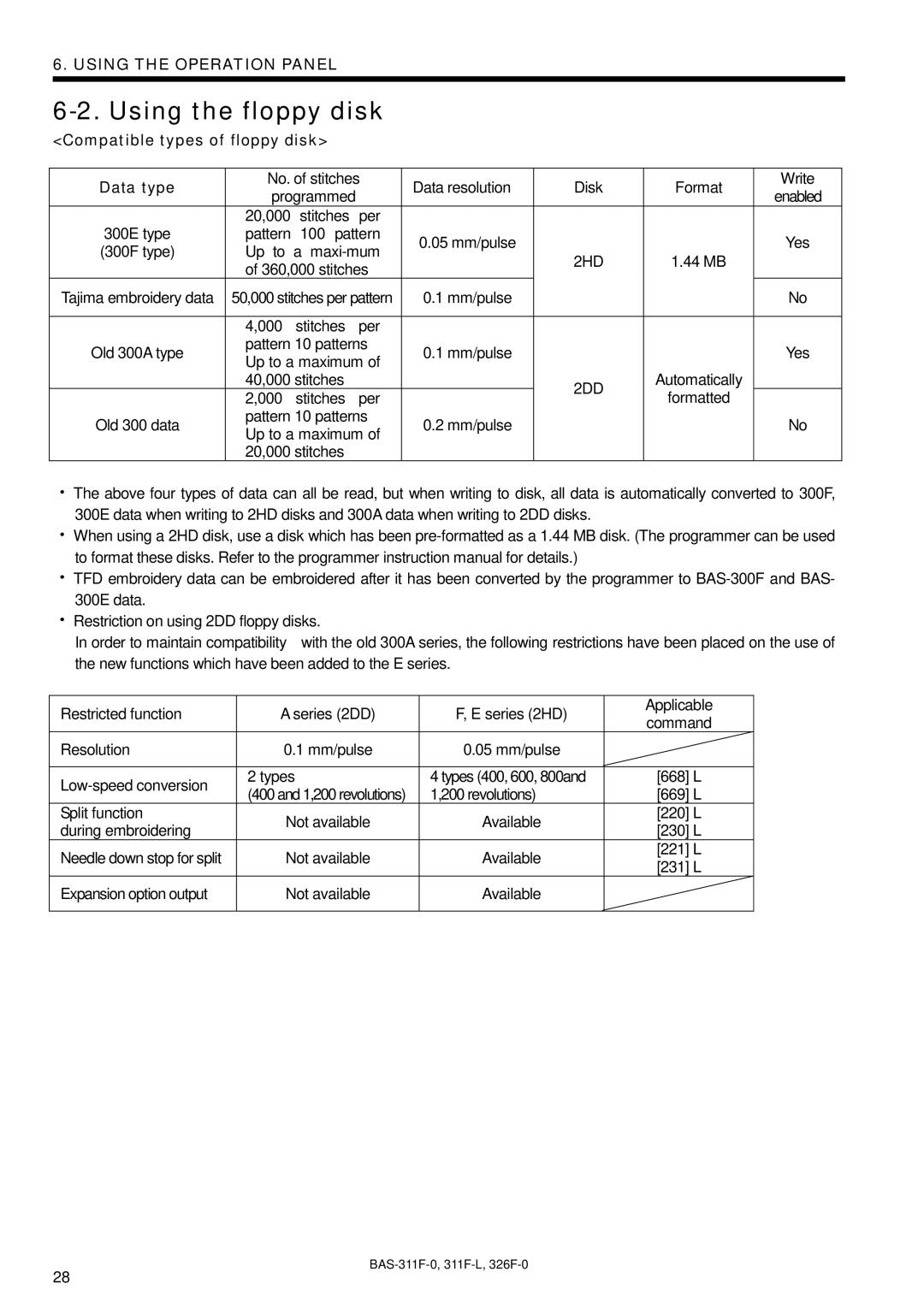
6. USING THE OPERATION PANEL
6-2. Using the floppy disk
<Compatible types of floppy disk>
Data type | No. of stitches | Data resolution | Disk | Format | Write | |||
programmed |
| enabled | ||||||
|
|
|
|
| ||||
| 20,000 | stitches | per |
|
|
|
| |
300E type | pattern | 100 pattern | 0.05 mm/pulse |
|
| Yes | ||
(300F type) | Up to a | 2HD | 1.44 MB | |||||
|
| |||||||
| of 360,000 stitches |
|
| |||||
|
|
|
|
| ||||
Tajima embroidery data | 50,000 stitches per pattern | 0.1 mm/pulse |
|
| No | |||
|
|
|
|
|
|
|
| |
| 4,000 | stitches | per |
|
|
|
| |
Old 300A type | pattern 10 patterns | 0.1 mm/pulse |
|
| Yes | |||
Up to a maximum of |
|
| ||||||
|
|
|
|
| ||||
| 40,000 stitches |
|
| 2DD | Automatically |
| ||
| 2,000 | stitches | per |
| formatted |
| ||
|
|
|
| |||||
Old 300 data | pattern 10 patterns | 0.2 mm/pulse |
|
| No | |||
Up to a maximum of |
|
| ||||||
|
|
|
|
| ||||
| 20,000 stitches |
|
|
|
|
| ||
![]() The above four types of data can all be read, but when writing to disk, all data is automatically converted to 300F, 300E data when writing to 2HD disks and 300A data when writing to 2DD disks.
The above four types of data can all be read, but when writing to disk, all data is automatically converted to 300F, 300E data when writing to 2HD disks and 300A data when writing to 2DD disks.
![]() When using a 2HD disk, use a disk which has been
When using a 2HD disk, use a disk which has been
![]() TFD embroidery data can be embroidered after it has been converted by the programmer to
TFD embroidery data can be embroidered after it has been converted by the programmer to
![]() Restriction on using 2DD floppy disks.
Restriction on using 2DD floppy disks.
In order to maintain compatibility with the old 300A series, the following restrictions have been placed on the use of the new functions which have been added to the E series.
Restricted function | A series (2DD) | F, E series (2HD) | Applicable | |
command | ||||
|
|
| ||
Resolution | 0.1 mm/pulse | 0.05 mm/pulse |
| |
|
|
|
| |
2 types | 4 types (400, 600, 800and | [668] L | ||
(400 and 1,200 revolutions) | 1,200 revolutions) | [669] L | ||
| ||||
Split function | Not available | Available | [220] L | |
during embroidering | [230] L | |||
|
| |||
Needle down stop for split | Not available | Available | [221] L | |
[231] L | ||||
|
|
| ||
Expansion option output | Not available | Available |
| |
|
|
|
|
28
